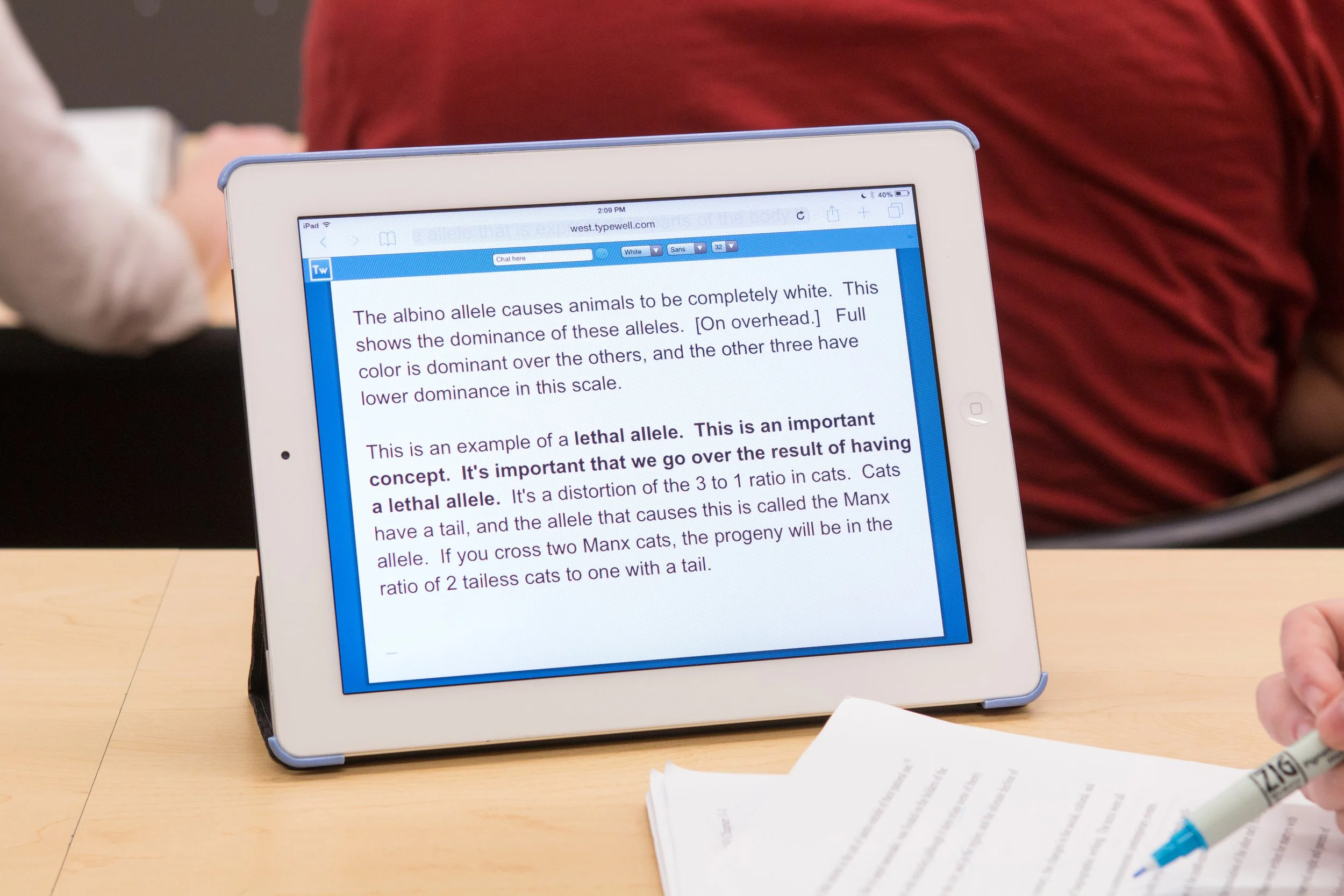Why TypeWell Outperforms AI Captioning
Note: In this article, the term “AI captioning” refers to automated speech-to-text systems powered by large language models (LLMs) and related technologies.
The Human Advantage in Real-Time Accessibility
As interest grows in using AI for speech-to-text services in the classroom — including as a replacement for human transcribers — it’s important to recognize what’s at stake. While automated captioning and human transcription both serve a similar purpose in providing communication access, they do so in fundamentally different ways. Understanding those differences is critical to ensuring real-time access that supports learning, rather than just mirroring spoken words.
Our TypeWell live captions are shown on an iPad during a classroom genetics lecture.
1. Humans Convey Meaning, Not Just Words
AI tools can capture words, but they cannot yet capture meaning on the fly. In education, clarity is critical for true accessibility. Verbatim text may look complete, but in practice it can be overwhelming, fatiguing, and impossible to process live.
At Intellitext, our human transcribers provide meaning-for-meaning transcription using the TypeWell system, which is designed not to record every word but to deliver clear, coherent communication that readers can actually follow in real time.
AI captions often include every filler word, such as “um” and “like,” along with false starts and meaningless repetitions. For a student or participant trying to keep up, that jumble can be exhausting. TypeWell transcribers are trained to filter out distractions, summarize ideas, and preserve meaning. These are skills that no automated tool can replicate live.
AI Output:
I need you to remember to… wait, did we already go over this? The exam… oh, right, I think we did, how I’m letting you do a retake that replaces your lowest exam grade?TypeWell Output:
I believe I mentioned that students can retake the exam, and the new score will replace their lowest exam grade.
The TypeWell result is clear, concise, and effortless to read.
2. The Human Brain Handles Nuance
Spoken language is full of nuance. Think about things like tone, humor, sarcasm, side comments, and overlapping speech. Humans can interpret all of that in real time, where AI often fails to catch the important cues.
Catching those nuances matters. A professor might rush through material and joke, “Did I mention there’s an exam on this in five minutes?” as the class laughs. An AI transcript would record only the words. A TypeWell transcriber would include a “[Sarcasm]” indicator, along with the “[Laughter]” from the classroom.
A trained human listener ensures that what appears on the screen reflects the speaker’s intent, not just the verbatim text. This is critical for equitable access in instructional settings.
3. Accurate Transcription for Diverse Voices and Accents
AI captioning often struggles with regional dialects, non-native English speakers, or technical terminology. Intellitext matches each class or meeting with a transcriber experienced in that subject or accent.
This intentional matching process ensures that every speaker is understood accurately, not just transcribed phonetically, promoting fairness and inclusion for all participants.
4. Protecting Privacy in Real Time
AI tools record and store everything verbatim, including sensitive information that should remain private. By contrast, TypeWell never records or stores audio, and trained transcribers follow best practices to avoid recording personally identifiable information unless explicitly required.
TypeWell transcribers apply ethical judgment as they work, removing student names from K-12 uploaded transcripts when disciplinary action is referenced to protect privacy and maintain compliance. Clients can also customize their privacy preferences at any time.
That human awareness of privacy keeps transcripts confidential, compliant, and trustworthy.
5. Live Human Tech Support
Even the best technology can fail, from a lost connection to a muted microphone, or distorted audio. With Intellitext, the human transcriber is always monitoring the session and ready to help.
If an issue affects audio quality or temporarily interrupts access, our team helps identify the cause, guides in adjusting equipment, and, when needed, ships replacement microphones to ensure better sound quality in the future.
For K-12 clients, coordinators are alerted if any concerning behavior affects the student, and administrators can respond as needed. Having another adult present ensures your student’s safety and well-being is always supported in the classroom.
This level of reliability and support simply are not possible with automated systems running unattended.
About Intellitext
At Intellitext, we believe true accessibility is built on human understanding. Our team of experienced TypeWell transcribers provides real-time, meaning-for-meaning access for classrooms, events, and professional settings nationwide.
Contact us for a complimentary two-hour trial and see why K-12 districts, colleges, and universities across the country trust Intellitext to meet their live captioning accessibility needs.


